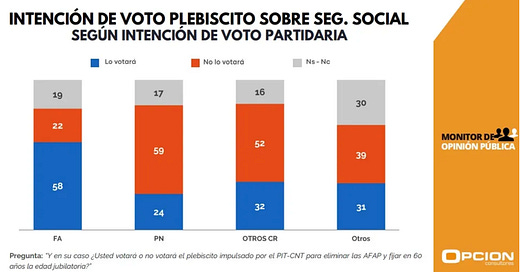Uruguay - Election Notes - September 2024
The first round is about the pension counter-reform referendum. The side that wins the referendum likely loses the second round of the presidential election.
Uruguay goes to the polls on 27 October to elect its president, both houses of Congress, and vote on two controversial referendum questions on security and pension reform. If no presidential candidate receives over 50% in the first round, a second round presidential election will be held on 24 November.
Polls suggest Yamandú Orsi of the Frente Amplio will receive around 45% in the first round. Polling for a hypothetical second round suggests Orsi narrowly ahead of potential opponents, but it's probably better to call the second round a tossup at the moment. Hypothetical second round polling is notoriously bad and the impact of the referendum questions in the first round will sway second round votes. A recent Wilson Center event discussed the presidential election in more detail.
Markets are nervous about the pension counter-reform referendum. The referendum, brought by the country's leading leftwing unions, will undo a pension reform done by the Lacalle Pou government. It will formally change the constitution to a) lower the retirement age to 60, b) offer a baseline minimum pension payment, and c) eliminate the private personal retirement fund managers that currently run much of the pension system.

My reading of the current polls indicates that the pension counter-reform referendum would pass if it were held today. Somewhere between 20% and 35% of voters are currently undecided on the pension reform. Many voters say they are relatively uninformed about the issue. As worded, the question appears quite favorable toward improving the conditions of retirees, which will sway some voters to be in favor. The voters who prefer the Frente Amplio, which will likely win over 40% in the first round, are quite favorable to the counter-reform questions. The voters who prefer various governing coalition candidates are neither as strongly opposed to the referendum nor are they particularly mobilized about it.
While the referendum would pass today, its passage in late October is not guaranteed as public opinion could shift between now and then. The ruling party has just begun a more forceful campaign effort to explain to voters why they believe passage of this referendum would be bad for the economy. In contrast, the Frente Amplio leadership seems nervous about the pension referendum and is not as actively campaigning for its passage.
If the pension reform passes (which I think is about 60% likely right now), then markets will panic, voters will believe they need a president capable of moderating the impact of the pension counter-reform, and the odds for the governing party to retain the presidency will increase. However, if the pension reform fails, it makes it more likely that voters will favor the side of change in the second round and choose Orsi of the Frente Amplio to win the presidency.
One round will be balanced by the other round, and analysts will again praise Uruguay's moderation. However, it feels like they are doing it the hard way this time.


